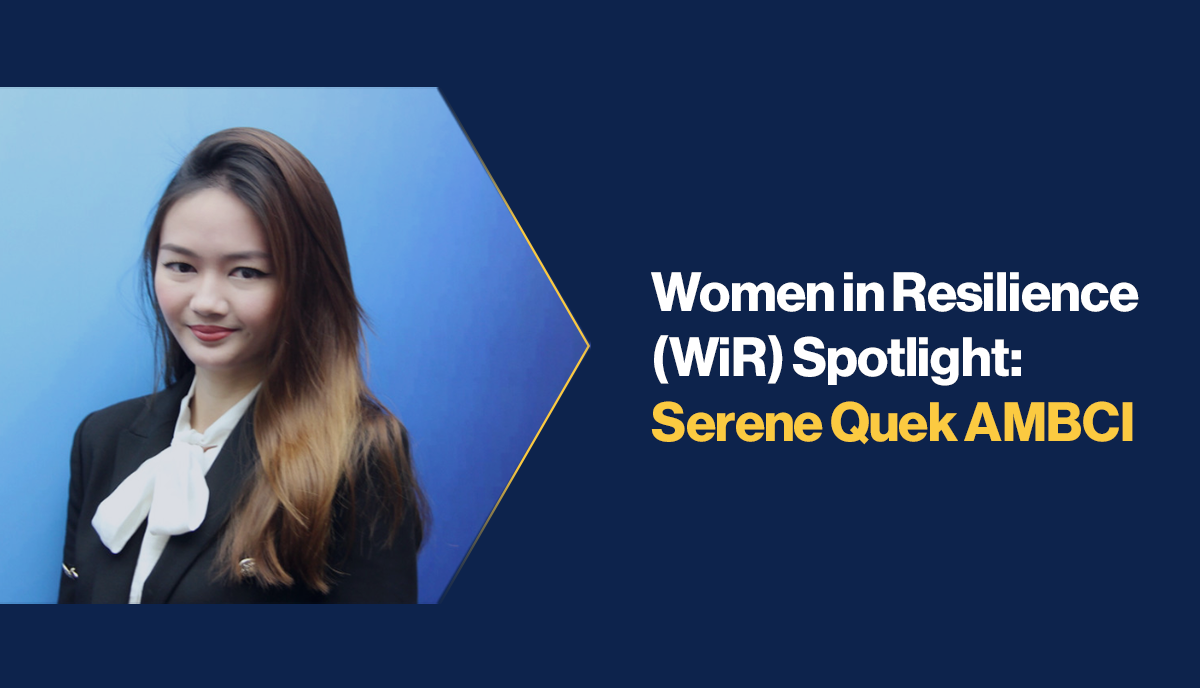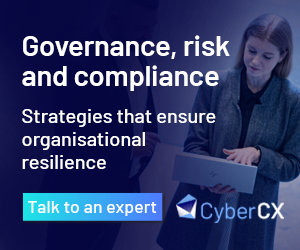Women in Resilience (WiR) Spotlight: Serene Quek AMBCI

Serene Quek has 10 years of experience in Risk Management, Business Continuity and Crisis Management across Asia Pacific, particularly in the financial industry. Having gained the experience both as an in-house practitioner as well as from providing advisory services as a consultant, she has a broad perspective of risk and resilience and is able to leverage on her experience and insights from both angles.
What brought you into the industry?
In March 2011, Japan was hit by an earthquake of a 8.9 magnitude which resulted in a tsunami that killed many people and caused major disruptions to lives and businesses. Notably, it also triggered the meltdown of the nuclear power plants in Fukushima – up to today, the world is still struggling to deal with its radiations and environmental impacts.
I was watching a television programme about the horrific aftermath of the disaster and wondered if the consequences of the disaster could have been either mitigated if people and businesses were more prepared to deal with the earthquake and the consequent tsunami.
I was intrigued; so I began researching Risk Management, Crisis Management and Business continuity as I felt a strong urge to make a difference. I wanted to join a profession that would help safeguard lives, properties and businesses.
Upon graduating as a Mechanical Engineer, I was determined that this was the discipline for me and began my search for opportunities in this direction.
How did you reach your current position? What challenges did you face?
I think it is important to identify where your passion lies, persevere relentlessly and not be afraid of what obstacles you may find along the way. If anything, challenges and setbacks are opportunities to improve your skills and they contribute to your learning and growth. As long as you stay focused and committed, your hard work will pay off eventually.
I am a firm believer of continuous learning and that the workplace is just one of the many avenues to learn. On top of the training and mentorship received at work, I also invested time and effort attending courses, participating in conferences and networking with other practitioners. Being involved in the community also helped me stay up-to-date with the latest industry good practices and trends.
Throughout my career I have also met inspiring people in the industry whom I aspire to be and this has also been a source of motivation for me.
It has been a very rewarding journey with, of course, a few challenges along the way. One most faced by practitioners in this field is raising awareness of risk and resilience and embedding the right corporate culture. It is also essential to build a good relationship with stakeholders to establish communication channels and have strong support from senior management is also key to drive things in the right direction.
Which specific skills do you think are needed to become a leader in your field?
I can think of many skills that are good to have, but below are those that I feel are essential to be a successful leader in the industry today.
Perseverance: In our line of work, some things are not so straight forward; there are challenges and obstacles along the way. It is important to have the determination to carry on with what you believe is the right thing to do and also have the mental tenacity to overcome challenges and any potential setbacks. After all, these are what make us stronger.
Empathy and active listening: I like how a mentor of mine described the work we do as ''an art and not a science’’. The basis of our work lies in building good relationships with people - and this is an art in itself. Many times, I find that being a good listener and showing empathy helps establish good relationship with people as they feel that they can connect with you. Once a good relationship and communication channels are established, half the work is considered complete.
Communication: The style of communication of a leader is key, specifically the ability to communicate clearly, accurately and of course, powerfully. Let your voice be heard, however, always remember to remain approachable and open to feedback as communication is only effective when it is two ways.
Collaboration: In our industry, we need to work with people from all levels in the organisation to achieve our objective - to enhance the resilience of the business. Moreover, collaboration will lead to greater cohesion and uplift morale. Being able to work collaboratively and encourage teamwork amongst stakeholders is a testament to good leadership.
Of course, as always, a little charisma goes a long way!
Do you think that the BCI WiR initiative will influence our industry? If yes, how?
Yes, of course! Besides being a fantastic platform for sharing ideas and best practices, I think this initiative is a great way to dispel the misconception of any gender bias by giving recognition to women in our industry for their contribution and showcasing their achievement. This community will also provide an avenue for support and empower women (as well as men) in our industry to pursue what they hope to achieve.
What changes would you like to see in the profession?
Business Resilience is commonly regarded as a ‘cost center’, but I hope that this perception will change as more companies begin to realize the benefits of building their resilience early on. By investing in resilience, they are essentially investing in their future and safeguarding their interests by preparing themselves for crises and adversities. Therefore, I would love to see companies invest more resources, in terms of manpower dedicated to this function as well as providing the right tools and training required for practitioners to upskill themselves.
I also hope to see the industry dispel gender, age, ethnic or other forms of bias by demonstrating meritocracy - where equal opportunities are offered to qualified individuals for leadership roles.
In your opinion, why should more people be joining the resilience community?
Unfortunately, we have all seen how the COVID-19 pandemic has adversely impacted the global economy and continues to destroy many lives and businesses. I think it is so important to raise awareness so that people are informed and educated in resilience, not only at work, but also in their personal lives. This community allows fellow practitioners to share their insights, experience and resources with one another. The bigger our community, the greater the difference we can all make in our respective areas.

